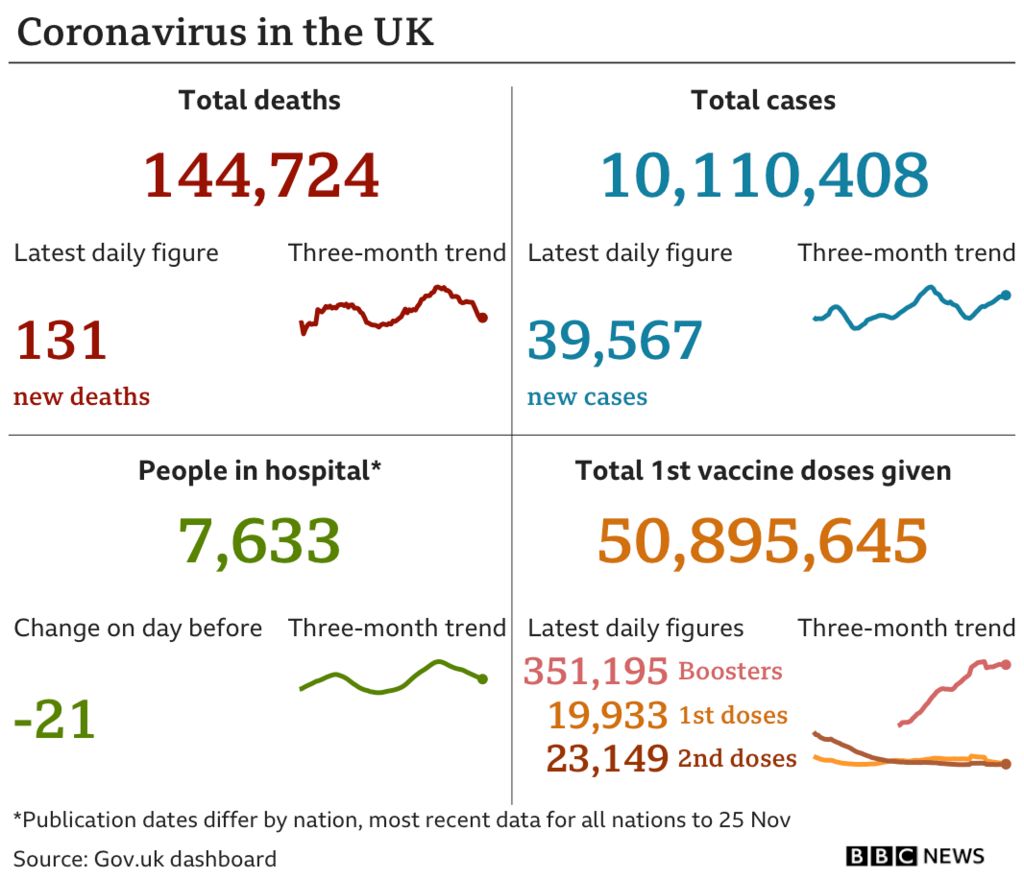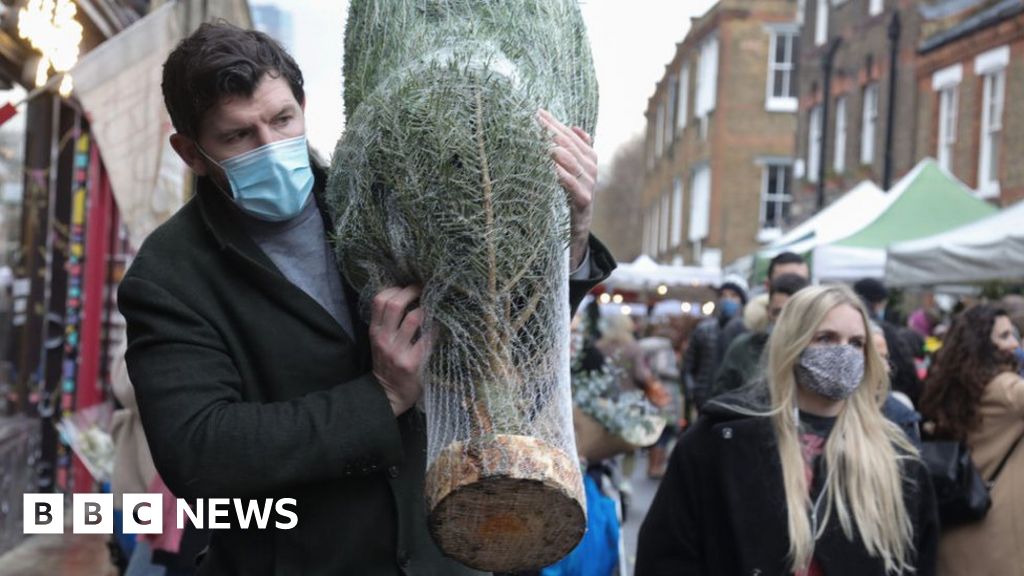This video can not be played
To play this video you need to enable JavaScript in your browser.
Face masks will be compulsory in shops and on public transport in England, and UK arrivals are expected to have to take PCR tests from Tuesday in response to the new Omicron variant.
Health Secretary Sajid Javid said the measures would help to ensure that people can “enjoy Christmas with our families”.
Mr Javid said the government had acted “swiftly” and “in a proportionate way”.
But a doctor who treated the variant said there had been unnecessary panic.
Meanwhile, adults aged 18 and over “will have an offer of a booster earlier than we had previously envisaged”, the deputy chairman of the Joint Committee on Vaccines and Immunisation told BBC Radio 4’s Broadcasting House.
Professor Anthony Harnden said: “There is a very good, strong argument for raising the antibody level in the whole of the community. So accelerating the booster programme both by extending the age range and by reducing the interval between the second dose and the booster dose, would be a sensible strategy.”
The government has stopped short of issuing advice to work from home and extending vaccine passports in England, which are part of its Plan B for winter – a contingency plan if intervention on Covid is needed to protect the NHS.
Mr Javid told the BBC’s Andrew Marr Show that the government “could not have acted more swiftly”.
“The reason we’ve set out these measures yesterday is to protect the progress we’ve made so we can all continue to enjoy Christmas with our families,” he said.
He said the UK would take further action “in a proportionate way wherever necessary” but he did not think working from home guidance was needed.
He did not outline when PCR tests for overseas arrivals would be required, saying it would be “as soon as possible” but he needed agreement from all UK four nations. The government website said the change would be implemented from 04:00 GMT on Tuesday.
Mr Javid told Sky News the face mask rules would also be implemented on Tuesday, bringing England in line with the rest of the UK, but he hoped all the new measures could be lifted again “within weeks”.
The South African doctor who treated early cases of the Omicron variant told the BBC countries could be “panicking unnecessarily” and the symptoms she had seen were “extremely mild”.
Dr Angelique Coetzee, chair of the South African Medical Association, said she had first encountered the variant in patients who had fatigue, aches and pains, but no cough or change in sense of smell or taste. “We haven’t admitted anyone,” she said.
But she acknowledged that understanding of the variant was developing and in two weeks’ time they would know more.
Scotland’s First Minister Nicola Sturgeon said “we may need to go further in restricting travel in the days to come”, adding: “We need to be open-minded to doing anything to keep the population safe.”
At a Downing Street news conference on Saturday, the prime minister called the new measures temporary and precautionary – and said they would be reviewed in three weeks, just before most schools break up for the Christmas holidays.
Labour has called for full implementation of Plan B and for improved sick pay to encourage self-isolation.

All the measures can do is buy time

The government’s response is to test everyone coming in to the UK, isolate all Omicron contacts, ramp up boosting and bring back compulsory face masks in some public places.
Let’s be clear – that will not stop more Omicron cases arriving or circulating. It’s already arrived. If a virus is good at spreading then eventually it will slip through.
And it has the potential to spread here too. Cases of Covid have been climbing except for a lull over the October half term.
They are averaging at more than 40,000 a day and the R number is just above the crucial threshold of one. If Omicron can combine faster transmission with some ability to evade immunity then it too could spread.
All the measures can do is buy time, but for what? Science and boosters.

Boris Johnson announced the restrictions after it was confirmed that two Omicron cases had been detected in Brentwood, Essex, and Nottingham. Officials said the cases were linked and connected to travel in southern Africa, where the new variant was first identified.
Under the plans:
- Everyone entering the UK (other than those coming from the Common Travel Area that covers the Channel Islands and Ireland) will have to take a PCR test by the end of the second day after their arrival and self-isolate until they receive a negative result
- All contacts of suspected Omicron cases must self-isolate, regardless of whether or not they are fully vaccinated
- Face coverings will be made compulsory in shops and on public transport – but pubs and restaurants are exempt
- The health secretary has asked advisers to consider rapidly extending boosters, including reducing the gap between the second dose of the vaccine and the booster
In Scotland, Wales and Northern Ireland, face coverings are already mandatory on public transport and many indoor areas.
Retail and health workers said the rules on face masks should never have been relaxed, with shopworkers’ union Usdaw accusing ministers of “flip-flopping on basic and sensible Covid measures” while the Royal College of Nursing said “it should not have been a new variant that forced the prime minister to act”.
But Mick Lynch, general secretary of the Rail, Maritime and Transport union, said “there are major issues about enforcement and it is our members left in the front line with angry passengers who refuse to comply”, and called for more resources to support policing the rule.
One change has already been implemented. Ten countries – South Africa, Namibia, Zimbabwe, Botswana, Lesotho, Eswatini, Angola, Mozambique, Malawi and Zambia – are now on the UK’s travel red list. That was applied from 04:00 GMT, meaning that until further notice any British or Irish residents arriving in the UK after recently visiting any of those countries will have to quarantine in an approved hotel for 10 days.
Residents from the countries themselves will not be allowed into the UK until the red list status changes.
The average number of daily confirmed Covid cases in the UK began rising again in early November. A further 39,567 confirmed cases were announced on Saturday.


This is a moment the government had wanted to avoid.
We’ve got used to restrictions in England being lifted. But for the first time in months, they’re now being re-imposed in response to the new variant.
And these restrictions could have a significant impact.
For example, anyone who goes on holiday will now need to pay for a PCR test and self-isolate until they get a negative result. If Omicron spreads quickly, there could be a lot of people forced to self-isolate for 10 days as close contacts.
But the government hasn’t gone for its full plan B. Masks won’t be mandatory in hospitality settings in England like they are in Scotland.
People aren’t being told to work from home – and there still aren’t plans for vaccine passports.
But it’s a sign of the uncertainty and concern in Whitehall that Boris Johnson felt he had to announce these measures.


